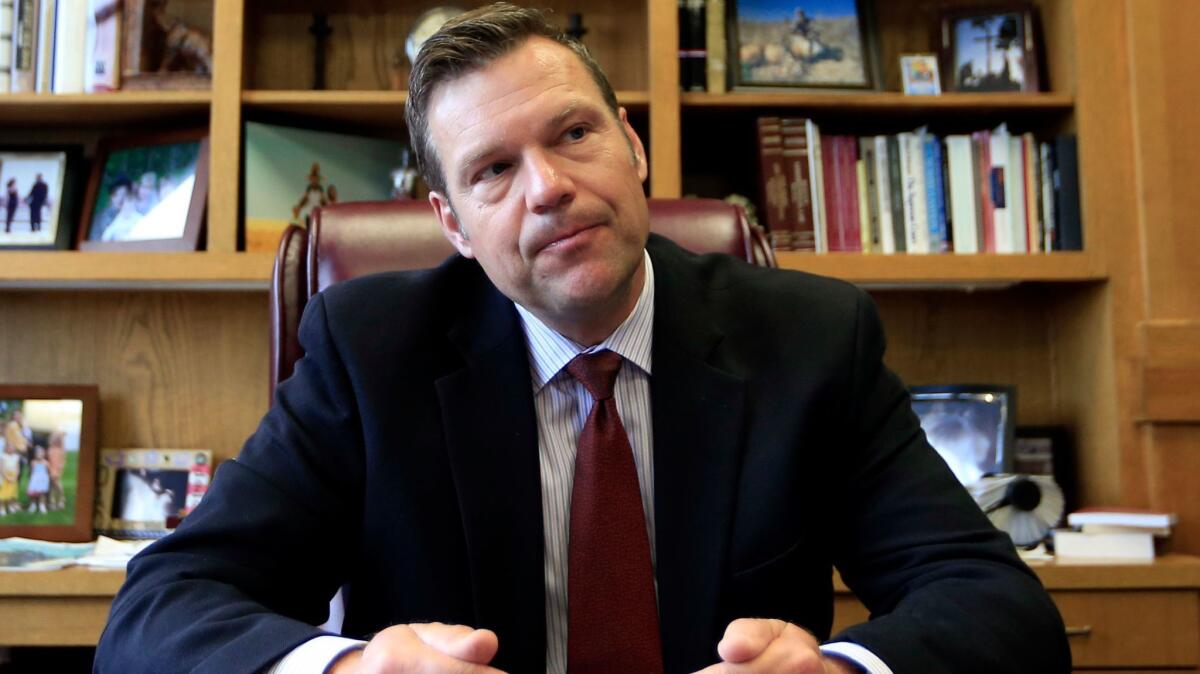Voter fraud commission is urged to consider using gun background-check system for voter eligibility

- Share via
Reporting from Washington — Fueling concerns about the impartiality and seriousness of President Trump’s voter fraud commission, members heard testimony Tuesday from a gun rights advocate who suggested using the background-check system for gun purchasers to determine the eligibility of Americans to vote.
John Lott, head of the gun rights advocacy group Crime Prevention Research Center, suggested such a process would ease the concerns of those worried about fraudulent voting.
“It might be a way Democrats can use a system they claim works very well to go and prove, essentially, to Republicans that there’s no fraud,” said Lott, who last year criticized the same National Instant Criminal Background Check System as a “mess.”
Every credible study of voting fraud has determined it is either virtually nonexistent or too rare to affect outcomes.
The commission was created after Trump falsely insisted that he lost the popular vote due to millions of fraudulently cast votes.
Critics assailed the notion that guidelines created to prevent dangerous or unstable people from purchasing a gun should be used to determine who may vote.
Since the mid-20th century, Congress and the Supreme Court have removed most barriers that had sought to restrict voting, such as racial discrimination or literacy tests. And some recent attempts to require that voters show certain types of IDs at polls have been rejected by lower courts as unconstitutional, raising questions about the legality of Lott’s proposal.
“That is absurd and dangerous,” said Liz Kennedy, director of democracy and government reform for the Center for American Progress. “The criteria built in to the National Instant Criminal Background Check System have no parallel to the requirements to be an eligible voter.”
Let America Vote, a group led by former Missouri Secretary of State Jason Kander, said in a Twitter post before the meeting that Lott’s idea “will create barriers to voting.” The American Civil Liberties Union of New Hampshire said in a series of tweets that Lott’s proposal compared “apples to alligators.” The ACLU accused the commission of “rigging the panels” with witnesses who raise “allegations of fraud so it can reach a result that will make voting harder.”
Maine secretary of state and commission member Matthew Dunlap expressed concern in the meeting that using a system for background checks could create “unintended consequences.”
“The NICS system was not designed for elections,” he said.
The current background check system examines a variety of factors, including drug addiction, mental instability, citizenship and criminal record.
Lott made his proposal at the second meeting of the Presidential Advisory Commission on Election Integrity, which has been accused of operating under preconceived notions that voter fraud played a role in the 2016 presidential election.
These concerns were heightened for many when vice chairman of the commission, Kansas Secretary of State Kris Kobach, published an op-ed last week on Breitbart News, asserting that there was voter fraud in the New Hampshire Senate race in November because thousands of voters used out-of-state driver’s licenses. Since the article’s publication, voting rights advocates have pointed to the fact that New Hampshire allows out-of-state licenses to be used in elections.
After the article, many people called on New Hampshire Secretary of State Bill Gardner, who is a member of the commission, to step down. Gardner, a Democrat, declined, saying Tuesday at the meeting that “New Hampshire people aren’t accustomed to walking away or stepping down from their civic duty, and I will not either.”
But he took the opportunity to publicly criticize Kobach for spreading misinformation and casting doubt on the New Hampshire results.
Kobach was referring to the Senate contest between Republican incumbent Kelly Ayotte and Democrat Maggie Hassan, who won the election by a small margin. New Hampshire’s other Democratic senator, Jeanne Shaheen, said in a statement that claims of voter fraud in the state and nationwide “undermine confidence in our elections and democracy and create a dishonest rationale for voter suppression laws.”
ALSO
Here’s why a growing number of states are pushing back against Trump’s voter fraud commission
Trump and Pence defend voter fraud panel at first meeting
More to Read
Get the L.A. Times Politics newsletter
Deeply reported insights into legislation, politics and policy from Sacramento, Washington and beyond. In your inbox three times per week.
You may occasionally receive promotional content from the Los Angeles Times.










